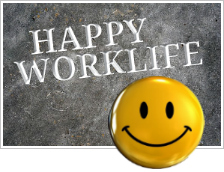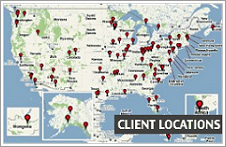You’ve come to the right place for buzzword-free info about work, workplaces, and workplace improvement. These posts are all about improving work processes, strengthening teamwork, sharpening management skills and leadership skills, improving communication, and more. This is info you can use right away, full of practical ideas in straight-talking plain English. Enjoy!
• Have a suggestion or question for a possible future post? Please let us know.
10 ways to boost your energy at work

Want to increase your at-work energy? Here are ten caffeine-free actions guaranteed to boost your presence and productivity.
1. Mix with different people. Step away from your immediate work area — and into a new work unit, floor, or department. Meet, greet, and learn what these other folks do.
2. Get up and move. Not long ago, most jobs involved standing, walking, and moving around. In today’s knowledge-worker world, not so much. Do your body a favor and take active breaks every day.
3. Do things differently. A little change can shake you up in an energy-building way. Start your day with something different. Change the order of your activities. Take a new approach with an old work task. Stop going through motions that have lost their meaning.
4. Lend a hand. We all need help now and then. Tune in to your colleagues, and step forward whenever your skills, expertise, and empathy might make a difference.
5. Visit with your customers. Maybe your job puts you in contact with the people you serve. If not, then find them, spend time with them, listen, and learn. When you see how people benefit from your work, you’ll feel a surge of energy.
6. Tell success stories. Did someone go the extra mile for a customer? Did an unsung workplace hero help someone meet a tough deadline? Did a creative colleague come up with a big idea? Watch for good news and spread it around.
7. Learn with others. Attend a learning session with a co-worker. Start a book group. Circulate that timely work-related article to team members. Make learning an everyday priority.
8. Be a coach. Don’t diminish your skills and expertise. There’s a lot you know that others need to know, so please be a generous teacher.
9. Make it better. Do your work processes show room for improvement? Then get busy with colleagues to analyze and strategize. But be ready to break from the past while you break apart those old ways of doing things.
10. Take on a big challenge. Stretch your skills on a new project. Take that big idea you’ve had for months now and be the one who gets it started. By expending energy in a positive way, you’ll get much more in return.
Are you really a problem solver?

When you encounter a problem that’s easily solved, you solve it, right?
You probably said yes. I’d say yes too. Most people think of themselves as problem solvers.
But what about our actions? Are we actually solving problems — especially little ones — or are we mostly thinking about them, talking about them with colleagues, and wringing our hands?
These questions came through loud and clear for me at a recent conference.
When sound problems kept the people in the back of the ballroom from hearing the keynote speaker, a few of them spoke up about ten minutes into the presentation. An audio tech fiddled with some controls, the speaker adjusted the microphone, and the sound quality improved slightly. But the people in back still couldn’t hear without straining.
The folks in the front reported better sound quality, and seats were available. So guess how many people moved from the back to the front?
Out of about one hundred people struggling with suboptimal sound, 3% took matters into their own hands to solve the problem.
As for the 97%, perhaps they figured that the audio tech would eventually work a miracle. Perhaps they expected the speaker to switch from the clip-on microphone to the one with a cord. Or maybe they were so settled into their seats that they stayed put by default.
Keep this story in mind as your week unfolds, because you’re likely to face similar situations in which problems arise and solutions are within easy reach.
Will you count on someone else to effect a fix, will you submit to inertia, will you complain to yourself or to a colleague? Or will you work out a solution right there and then?
For workplace nirvana, add in the five C’s

A friend of mine contends that great jobs boil down to three things: praise, perks, and pay. The more you get, the better things are.
It’s an appealingly simple formula — but it’s woefully incomplete.
I’ve spent years exploring what matters most to people at work, and I know that praise, perks, and pay are important. The degree of importance varies from person to person, but it’s nice to get that external validation every now and then. Plus, there are bills to be paid.
But there’s much more to the “great jobs” equation. Let’s call these additional factors the five C’s.
One of them is job content. As management guru Peter Drucker used to say, if you want people to do a good job, give them a good job to do. As much as possible, jobs should be designed so people can use their talents and strengths while seeing real results.
Unfortunately, many people are told exactly how to do their jobs, with little if any leeway. This takes us to the second factor: choice. When people can make their own choices and decisions to shape how they do their work, their engagement and enjoyment go way up.
The third and fourth C’s are related: collaboration and community.
When people can freely team up and help each other as the workday unfolds, it’s like getting additional brainpower. Over time, collaboration turns into community. Both factors affirm that we are human beings, not human doings. The social aspects of work are a big deal.
The fifth C might be the most important of all: caring. In great workplaces, people care about their customers. Co-workers care about each other. Bosses care about the people they manage, and vice versa. When people truly care, they show concern and strive to help others succeed, even when the people who benefit are not their close friends.
Don’t get me wrong, the three P’s are essential: praise (let’s call it genuine appreciation), perks, and pay.
So are the five C’s: content, choice, collaboration, community, and caring.
Add them up and you get workplace nirvana. It’s that simple — and that challenging.
Are your strengths turning on you?

Day after day, Bill sticks to his work routine like few people can. Co-workers tease him for his same-time arrival and departure each day, but they mean it as a compliment. They’re awed by his ability to do the same job over and over with little comment, no complaints, and consistently high quality. Says a co-worker: “The guy’s a machine.”
This is good, right?
To a point.
It’s easy to love the solid work ethic, predictable performance, and steady productivity. But too much self-enforced routine can move the mind to autopilot and render a person’s creative powers pretty much useless. That positive predictability can become a groove that turns into a rut that keeps Bill from ever seeing new ways of doing things that could produce better results.
Call it too much of a good thing. When a strength is overused and used exclusively, it can become a liability.
Look around and you’ll see plenty of examples.
That skillful analyst who revels in data and spreadsheets? She brings objectivity to the decision-making process, which is great. But she often gets stuck in an endless loop of over-analysis. She seeks data and only data for every decision — even for decisions that call for experience, intuition, and anecdotal information.
That creative type who’s always coming up with new ideas? He’s energy personified, and his presence adds spark to every meeting. That’s fantastic. But with his creativity running full tilt all the time, he zooms past the part where you’re supposed to focus on just one idea, develop it in detail, and get it going. The ideas keep coming, but nothing gains traction.
Responsible Robert? He ends up taking on so much work that he can’t do any of it well. Organized Olivia? She’s so organized that she’s one file folder away from being a control freak. Empathetic Edward? He spends so much time listening to people and their problems that he’s worn out.
What about your greatest strengths? Are you using one of them so constantly and exclusively that you’ve taken it to its counterproductive extreme?
If the answer is yes, here’s great news: As soon as you ease back on that one overused strength, you’ll give all of your other strengths more room to step forward and go to work.
The 10 Commandments of a Happy Work Life

1. Thou shalt honor thyself
Your brain can process 100 trillion instructions per second while using the equivalent of just 12 watts of power. Your heart beats 100,000 times per day, carrying your blood some 12,000 miles. You’re able to imagine, create, communicate, and love. Take time to be in awe of yourself.
2. Thou shalt be true to thyself
Only one person has your portfolio of experience, know-how, skills, and style. You’re in charge of putting it to work without compromise. If you need inspiration, consider Mother Teresa, Martin Luther King Jr., and Thomas Edison. These greats (and many others) enriched the world by making the most of their differences.
3. Thou shalt speak up
When you have a good idea, share it. When you have a question, ask it. When your help is needed, offer it. When you envision a better approach, put it in spoken word. Your voice needs to be heard.
4. Thou shalt strive to simplify
Take a fresh look at your schedule, and eliminate activities that seems important but aren’t. An action is either mission-driven or mere motion. Keep the former, ditch the latter.
5. Thou shalt assume the best
Few people wake up and declare: “I’m going to make this a horrible day for myself and my co-workers.” Most people want good days in which they use their know-how, exercise their creativity, and make a positive contribution. Assume and expect the best, and you’ll see more of it all around you.
6. Thou shalt fix processes, not people
It’s tempting to blame that missed deadline or fouled-up project on a nearby colleague. But the fact is, problems almost always occur because of process issues, not people. So cut your co-workers some slack — and enlist their help in analyzing and improving how things get done in your workplace.
7. Thou shalt serve a greater purpose
Henry David Thoreau put it well: “It is not enough to be busy — so are the ants. The question is: What are we busy about?” What is the mission that gives meaning to all of your work-related busyness?
8. Thou shalt be interested
Want to be interesting? Then be interested — in people, processes, clients, customers, competitors, and more. Open your eyes wider. Be more curious. Seek new challenges. Start more conversations. Make a point of asking questions rather than making statements. Turn your work world, and the larger world, into your own lifelong school.
9. Thou shalt honor time away from work
You’re a human being, not a human doing. Treat yourself accordingly by rounding out how you spend your time. Balance your time at work with time at home, outdoors, in the community, and elsewhere. You’ll recharge your battery while gaining new insights and perspectives that inform your work.
10. Thou shalt be thine own best manager
The sooner you take responsibility for your own happiness and fulfillment, the sooner you’ll achieve it.




